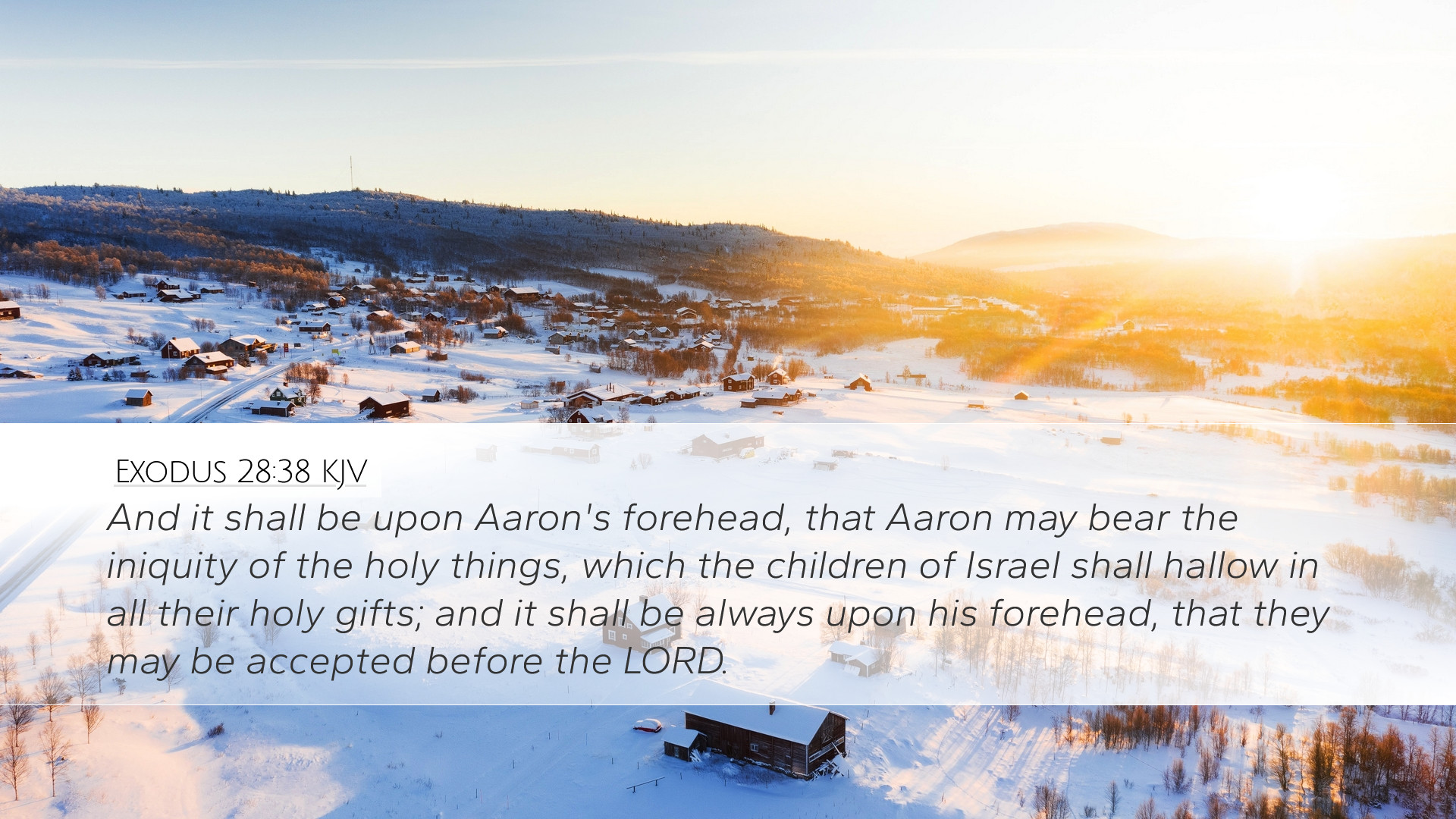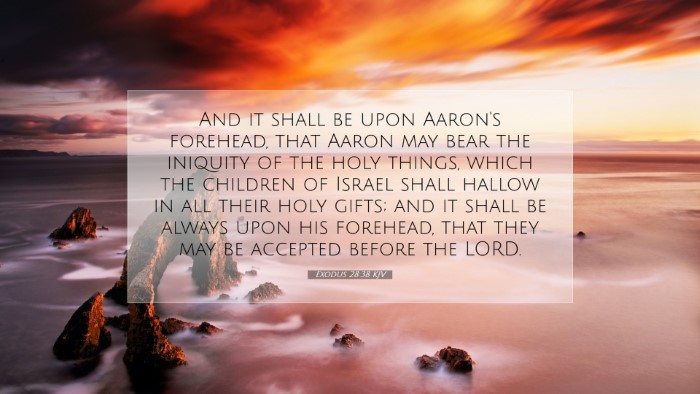Commentary on Exodus 28:38
Verse Reference: Exodus 28:38 - "And it shall be upon Aaron's forehead, that Aaron may bear the iniquity of the holy things, which the children of Israel shall hallow in all their holy gifts; and it shall be always upon his forehead, that they may be accepted before the Lord."
Introduction
The role of Aaron as the High Priest is significant within the framework of Israel’s sacrificial system. His garments, particularly the mitre that bears the inscription “Holiness to the Lord,” serve a dual purpose: they signify the holiness required for approaching God and bear the weight of the people's iniquities. Various commentators provide insights into the theological and practical implications of this verse.
Insights from Matthew Henry
Matthew Henry elaborates on the significance of the priestly garments, noting that they represent the people’s relationship with God. In this commentary, he states:
- The Responsibility of the Priest: Henry emphasizes that the priest carries the iniquity of the holy things, which underlines the seriousness of the priesthood. The High Priest stands as an intermediary who must bear the sins of the people to God.
- Holiness Required: The forehead plate (or mitre) being a constant reminder of holiness reflects the need for purity in approaching God. Henry asserts that this symbolically represents the necessity of the priest being always mindful of God's holiness.
- Acceptance Before God: According to Henry, the phrase “that they may be accepted before the Lord” points to the fundamental nature of atonement in the sacrificial system. It affirms the assurance that through the mediation of the High Priest, the people’s offerings find favor in God’s sight.
Insights from Albert Barnes
Albert Barnes provides a theological exploration surrounding the concept of atonement and holiness in Exodus 28:38:
- Understanding 'Iniquity': Barnes elaborates on what it means for Aaron to "bear the iniquity." He highlights that the term signifies a sense of responsibility that aligns with the larger theme of substitution often present in the sacrificial system.
- Symbolism of the Plate: He emphasizes that the inscription on Aaron's forehead signifies God’s ownership and the serious divine expectations placed upon the priest. This reflects God’s holiness and the necessity for the priest to be a model for the Israelites.
- Continual Remembrance: Barnes notes that the idea that the plate should always be on the High Priest's forehead indicates that God’s holiness is not a one-time thought but should be a continual reminder woven into the fabric of the priestly role. It creates an ongoing need for reverence and accountability before God.
Insights from Adam Clarke
Adam Clarke offers additional reflections on the role of the High Priest and the implications of this verse for the broader community:
- The Communal Aspect of Sacrifice: Clarke makes a poignant observation regarding the shared responsibility of sin within the congregation. He suggests that the High Priest's bearing of sin on behalf of the people highlights the community's collective need for atonement.
- Applicability for Today: He draws an application for contemporary readers by suggesting that just as Aaron bore the iniquities of the people, Christ fulfills this role as the ultimate High Priest in the New Testament, continually presenting His sacrifice before the throne of grace.
- The Importance of Holiness: Clarke insists that without holiness, a relationship with God cannot be sustained. The priest's role enforces the idea that access to God requires purity and dedication to His standards.
Theological Implications
The insights garnered from these commentaries reveal profound theological truths:
- Intercession: The High Priest's duty to bear the iniquity highlights the significant role of intercession in faith practices. This role is vividly paralleled in Christ’s intercessory work as the High Priest of believers today.
- Holiness and Acceptability: The necessity of holiness is a persistent theme within Scripture. The verse encapsulates the call for personal and communal holiness as essential for being accepted by God.
- Legacy of Priesthood: The historical context of the Levitical priesthood informs discussions on the role of ministers today. There is a bridge drawn between the Old and New Testament understandings of priesthood, establishing continuity in God's plan for redemption and relationship.
Conclusion
Exodus 28:38 does not merely serve as an ancient directive for Aaron’s garments but stands as a theological stronghold concerning atonement, holiness, and the concept of bearing sin. The reflections offered by Matthew Henry, Albert Barnes, and Adam Clarke illuminate the importance of these principles for both ancient Israel and modern faith communities. Their insights underscore the continuing relevance of God's calls to holiness and the recognition of the significant role of Christ as our High Priest. As such, this commentary serves as an essential part for pastors, students, theologians, and scholars in comprehending the intricacies of redemption and the weightiness of bearing iniquity in light of God’s holiness.


